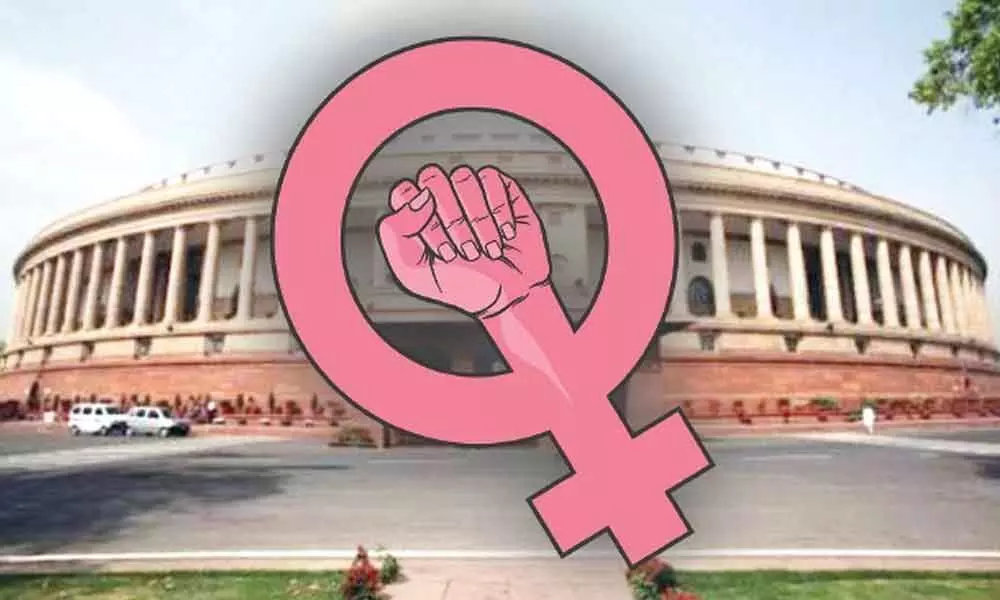Scientists probe link between poll promises and chances of women getting elected

Researchers are studying the association between the campaign promises made during state elections and the chances of women politicians getting elected in four districts of Bihar.
Researchers are studying the association between the campaign promises made during state elections and the chances of women politicians getting elected in four districts of Bihar.
The ongoing study, led by Indian-origin researcher Sayan Banerjee from the University of Essex in the UK, involves 2,500 volunteers spread across four districts and eight state constituencies in Bihar, who will be asked to choose between two hypothetical female candidates where each of them provides a separate electoral incentive.
"The survey experiment will test how much voters prefer three different type of electoral offers -- ethnic security, public goods (roads, electricity, schools etc.), and economic patronage ("freebies" - bicycles, colour tv etc.); when these offers are provided by women candidates from different ethnic (caste) backgrounds," Banerjee told PTI.
Ethnic security being probed in the study includes security from violence, access to law enforcement, and non-discrimination by the state institutions when faced with ethnic violence.
According to Banerjee, the four districts -- Madhubani, Munger, Katihar, and Gaya -- were chosen based on the levels of violent criminal activity reported from the regions.
He said Madhubani and Gaya experienced high rates of discriminatory violent crimes against oppressed lower caste communities, while Katihar and Munger had relatively lower levels of such crimes reported.
In districts like Madhubani and Gaya, Banerjee said, even though the Scheduled Caste and Scheduled Tribe (Prevention of Atrocities) Act, 1989 is implemented, caste-based and religion-based violence are still widely prevalent.
"If a police officer is upper caste, he'd beat up a person who is SC or ST. There are no promotions to judges from lower castes," he said. Banerjee added that in such cases, "if the judges are homogenous in a court, definitely for ethnic minorities, there is more discrimination."
In districts with histories of such violence, a higher political representation of ethnic minorities leads to improved reporting of these crimes, the Exeter University political scientist said.
"In the 90s there was lesser reports as people were afraid to come up, now there are more ministers and political representation and someone from an ethnic minority background can call up a local party worker and make them take care of their problems," Banerjee said.
"In these violence-prone places, people may prefer ethnic security over development projects like the building of new roads, sewer lines, or electricity transmission cables," he explained.
Banerjee hypothesises that voters in these crime-prone electorates primarily vote for female candidates who offer security as the first priority, followed by public goods as the next preference, and economic patronage as the last choice.
In these violent districts, Banerjee said, based on earlier studies, people generally prefer "Bahubali candidates who confirm to the rowdy stereotypes."
"We expect to find the same pattern in this research," he said. Speaking about the study, Milan Vaishnav, political economist and adjunct professor at Georgetown University in the US told PTI "I know of no empirical evidence that finds an association between the promise of handouts and the levels of violent crime."
"Even on the question of violence during elections, the empirical literature is divided.
Some studies find that violence spikes in election years and candidates and parties jockey for position, while others find that governments put a lid on violence during election years in order to produce a "feel good" feeling for voters," he explained in an email.
In more peaceful places, women who offer development promises are prioritised first, followed by those who offer freebies, and security is not usually a priority, Banerjee said.
The UK-based researcher hopes to understand from the study if voters prefer to elect women leaders from upper caste backgrounds or those from lower caste backgrounds, and what kind of incentives lower caste women need to provide to candidates to win elections. The study also hopes to unravel what kind of social networks female candidates are expected to be part of to be perceived as more electable.
"Do voters trust women from politically networked families more? From earlier studies we see that voters do choose often to vote for women in local gram panchayat and corporation elections, so does this help network to higher levels? these are some questions we hope to understand," Banerjee said.
"We hope to provide a likelihood score from one to five that will explain which candidate profile voters may choose in high violent districts.
For example, in a district with high rates of discriminatory crime, a hypothetical female politician may who offers security against violence may have a score of 4.4," the political scientist explained.

















